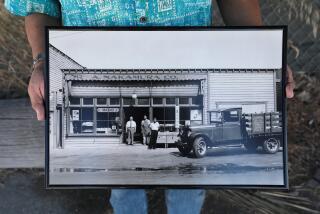Letters to the Editor: Were the stories about Japanese internment during World War II unbalanced? Two letter writers think so
Note to readers: Two letters published in the L.A. Times Travel section in print on Sunday, Dec. 11, and here online did not meet editorial standards. The Times’ Readers’ Representative says the letters weren’t ‘civil, fact-based discourse.’
Japanese internment
I see that writer Carolina A. Miranda has attached herself to the “I feel-good” contingent that feels sorry for the Japanese here in World War II [“ ‘Relevant’ Journey,” Nov. 27]. But this is just another anti-U.S. remake of history.
Remember, this was war for the life of our country. The Japanese had a clear way to land invading forces in California but lost their chance because they did not realize it.
Japanese have an extremely strong attachment to family, and even more so back then. First- generation and, to a lesser extent, Japanese here would have been expected to follow the wishes of their elders in Japan. Some, most or almost all might have refused, but the threat was there.
Had the Japanese been left on the streets of our city they would have been subject to hostility, injury and death at the hands of other citizens whose emotions ran high.
The U.S. government needed to concentrate on the war effort, not keep track of every reported espionage claim leveled against the Japanese. By the way, there were also internments for U.S. Germans though not as extensive as the Japanese.
Virtually everyone in the U.S. was assigned jobs to help the war effort. The Japanese were assigned the job of staying out of the way and not causing complications. Millions of Americans were assigned far worse jobs. Hundreds of thousands were wounded or died.
The interned Japanese were housed, fed, protected and cared for. Many who now complain would not even be alive if the internment had not been done.
I salute the Japanese for doing the part they were assigned during the war as I salute all those that sacrificed for the war effort. I have zero respect for those trying to rewrite history just to make themselves feel good.
Steve Hawes
Sunland
***
Maybe a little bit of balance in Miranda’s article would have been appropriate. You need to read “Killing the Rising Sun: How America Vanquished World War II Japan” by Bill O’Reilly and Martin Dugard to get the balance.
As the U.S. was putting families into the internment housing and feeding them, the Japanese were slaughtering Filipinos by the tens of thousands and U.S. soldiers after hideous torture.
War is evil, but I would have much rather been interned by the U.S. in California than by the Japanese in their captured lands.
One-way reporting is not very effective for the educated public. Please try a little balance next time. It’s a lot more effective and honest.
Dick Venn
***
Not just for campers
Thanks for the shopping tips. I never go camping, but the SteriePen Pure+ in “Gifts to Ease Them on Down the Road” [Terry Gardner, Dec. 4] sure would be handy for an earthquake kit.
Kurt Sipolski
Palm Desert
UPDATES:
Dec. 12, 10:11 a.m.: This article was updated with a note to readers
More to Read
Sign up for The Wild
We’ll help you find the best places to hike, bike and run, as well as the perfect silent spots for meditation and yoga.
You may occasionally receive promotional content from the Los Angeles Times.






